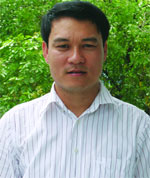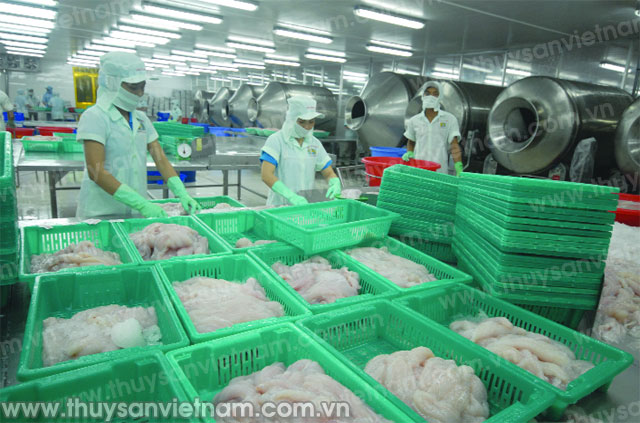(thuysanvietnam.com.vn) In the context that the Tra fish industry is facing a crisis, will the newly-launched project “Establishing a Sustainable Pangasius Supply Chain in Vietnam (SUPA)” be a “push for hope”? Ngo Tien Chuong – Coordinator of Aquaculture Programme of WWF Vietnam shared his views on the project.
Could you tell us how SUPA is different from other projects supporting the Vietnamese Tra fish industry?
 From the outline of the project, we analyzed and considered solutions to optimize funding from the European Commission (EC). We should not compare SUPA with other projects because each focuses on specific issues and has its own strengths. SUPA was launched in the context that the Tra fish industry needed to promote linkage chain to better market connection. We must say that the project’s approach ranges from producers to consumers with rational task assignment and coordination among partners. On the Vietnamese side, the Vietnam Cleaner Production Centre (VNCPC) of the Hanoi University of Technology is responsible for production technology; VASEP for electronic forum for information exchange; WWF Vietnam promoting sustainable production through the application of sustainability criteria and capacity improvement for farmers, breeding fish and feed production establishments; and WWF Austria for market research and connection in Europe through a system of importers and retailers.
From the outline of the project, we analyzed and considered solutions to optimize funding from the European Commission (EC). We should not compare SUPA with other projects because each focuses on specific issues and has its own strengths. SUPA was launched in the context that the Tra fish industry needed to promote linkage chain to better market connection. We must say that the project’s approach ranges from producers to consumers with rational task assignment and coordination among partners. On the Vietnamese side, the Vietnam Cleaner Production Centre (VNCPC) of the Hanoi University of Technology is responsible for production technology; VASEP for electronic forum for information exchange; WWF Vietnam promoting sustainable production through the application of sustainability criteria and capacity improvement for farmers, breeding fish and feed production establishments; and WWF Austria for market research and connection in Europe through a system of importers and retailers.
What is SUPA’s goal after four years of implementation (2013 – 2017)?
The project will focus on improving capacity and promoting responsible production in order to better product quality, minimize environmental impacts and reduce production costs through the application of the Resource Efficient and Cleaner Production (RECP), product innovation and market development. It will also provide information exchange and technical assistance for small and medium enterprises, household-scale producers to apply existing sustainability standards such as Agiculture Stewardship Council (ASC) certification … towards sustainable production to improve the industry’s competitiveness in the world market.

To help the Tra fish industry get out of the current difficulties, it is necessary to have multi-party cooperation – Photo: Ngoc Trinh
The objective of the project is to have at least 70 percent of Tra fish processors of the medium size upwards, and 30 percent of feed producers and small-scale independent breeding farms which actively apply the RECP method. In addition, at least 50 percent of the participating businesses will provide sustainable products meeting such standards as ASC for the European market and others.
We know that SUPA investment is 2.4 million EUR. Is it enough for the Tra fish industry to get out of the current crisis?
It can be said that 2.4 million EUR is not little for a project to be carried out in four years. However, to help the Tra fish industry get out of the current difficulties, it is necessary to have multi-party cooperation from state agencies, businesses, producers, and other stakeholders, including organizations like the WWF…
As you know, both Vietnamese Tra fish businesses and breeders are facing many difficulties. So what are benefits that SUPA may bring to them at this time?
As mentioned above, the approach of the project is “from top to toe” to solve the industry’s problems. SUPA will focus on more sustainable production methods such as the application of cleaner production technologies for energy saving and environmental friendliness, increase chain linkage to optimize benefits and application of ASC to meet market requirements.
Many Tra fish businesses and breeders worry that SUPA is established to sell standards, and this will cost them more. What do you think about this?
SUPA not only provides supply chain-based approach and assistance but also applies both “push” and “pull” methods for sustainable production and market promotion activities, including the application of research findings in reality. Therefore, the products of the project are businesses’ improved ability and better connection, so what businesses and farmers receive will never lose. As I have said, SUPA does not aim to build a new standard and there will not be any expense involved. In contrast, the project will organize events to facilitate information exchange between farmers and consumers at an annual seafood fair in Brussels, Belgium, and Vietfish in Ho Chi Minh City.
Thank you so much!
|
>> SUPA has a total budget of 2.4 million EUR (64 billion VND), with 1.9 million EUR funded by the European Union through the EU Switch – Asia Programme, accounting for 80 percent of the project’s total. The remaining 20 percent is contributed by projects stakeholders. |